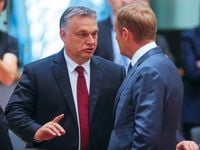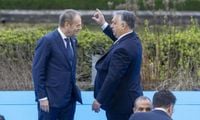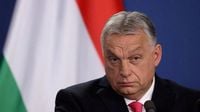In a heated exchange between Hungarian Prime Minister Viktor Orban and Polish Prime Minister Donald Tusk, Orban asserted on April 25, 2025, that Hungary will not leave the European Union but will instead work to transform it alongside other EU patriots. This statement came in direct response to Tusk's earlier comments suggesting that Orban was contemplating Hungary's exit from the EU.
Tusk, in a post on social media platform X on April 24, 2025, criticized Orban, stating, "Prime Minister Orban speaks openly about Hungary leaving the European Union. It was worth winning the elections so that Kaczyński's dream of 'Budapest in Warsaw' never comes true. This is also at stake in the upcoming elections." Tusk's remarks highlight the ongoing tension between the two leaders, particularly regarding their countries' positions within the EU.
Orban's comments reflect a growing discontent with the EU's current structure, suggesting that if the EU had appeared as it does today in 2004, Hungary might not have joined. He stated, "If the EU in 2004 looked like it does now, it is not certain that Hungary would have joined." This sentiment underscores a broader debate about the effectiveness and relevance of the EU, particularly among its Eastern European members.
During a forum organized by his Fidesz party in Pilisvoeroesvar, near Budapest, Orban elaborated on his views, asserting that departure from the EU should only occur when the disadvantages of membership outweigh its advantages. He emphasized that this moment has not yet arrived, stating, "Departure should occur when the disadvantages of membership outweigh its advantages, and this moment has not yet come." This cautious approach indicates that while Orban is critical of the EU, he is not advocating for an immediate exit.
Orban's response to Tusk also included a historical perspective, as he reminisced about the state of the EU when Hungary and Poland joined. He remarked, "In those times, Brussels bureaucrats served the people and did not interfere in the internal political affairs of member states, as they do now in Poland and Hungary." This critique points to a perception that the EU has shifted from its original purpose of serving its member states to one of overreach and interference.
Earlier this year, Orban had threatened not to support the extension of sanctions against Russia unless Ukraine resumed the transit of Russian gas to Europe. Tusk reacted to this by stating that if Orban were to block European sanctions at a critical moment in the ongoing conflict, it would be evident that he was playing on Putin's team, rather than aligning with European interests. Tusk warned, "If Orban blocks European sanctions, it will be absolutely clear that he is on Putin's team, and not on ours, with all the consequences of that fact."
The exchange between Tusk and Orban is part of a larger narrative concerning the relationship between Eastern European leaders and the EU. Tusk's comments reflect a commitment to maintaining a united front against external threats, particularly from Russia, while Orban's statements reveal a desire for reform within the EU rather than outright departure.
As the political landscape in Europe continues to evolve, the dialogue between Orban and Tusk serves as a microcosm of the tensions within the EU. With upcoming elections in Poland and ongoing debates about the EU's future direction, the stakes are high. Orban's insistence that Hungary will not leave the EU but instead transform it alongside other patriots may resonate with those who share his concerns about the current state of the union.
Ultimately, the future of Hungary's relationship with the EU remains uncertain, as both Orban and Tusk navigate the complexities of national interests and collective European goals. As these leaders continue to engage in public discourse, their exchanges will likely shape the narrative surrounding the EU's future, particularly in the context of rising nationalism and calls for reform.
In conclusion, the ongoing dialogue between Viktor Orban and Donald Tusk highlights the challenges facing the EU today. As both leaders articulate their visions for the future—one advocating for reform and the other for unity—their interactions will play a crucial role in determining how Eastern European countries position themselves within the broader European framework.



